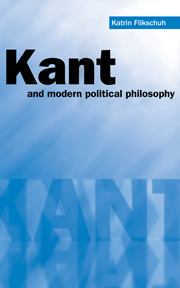Book contents
- Frontmatter
- Contents
- Acknowledgements
- List of Kant's works and abbreviations
- Introduction
- 1 Kantian metaphysics in contemporary liberalism
- 2 The metaphysics of freedom as an idea of reason
- 3 The morality of external freedom
- 4 The Lex Permissiva: property rights and political obligation in the Rechtslehre
- 5 The general united will and cosmopolitan Right
- 6 The metaphysics of Kant's cosmopolitanism
- Select bibliography
- Index
4 - The Lex Permissiva: property rights and political obligation in the Rechtslehre
Published online by Cambridge University Press: 22 September 2009
- Frontmatter
- Contents
- Acknowledgements
- List of Kant's works and abbreviations
- Introduction
- 1 Kantian metaphysics in contemporary liberalism
- 2 The metaphysics of freedom as an idea of reason
- 3 The morality of external freedom
- 4 The Lex Permissiva: property rights and political obligation in the Rechtslehre
- 5 The general united will and cosmopolitan Right
- 6 The metaphysics of Kant's cosmopolitanism
- Select bibliography
- Index
Summary
Postulate of Practical Reason with Regard to Right: It is possible for me to have any external object of my choice as mine, that is, a maxim by which, if it were to become a law, an object of choice would in itself (objectively) have to belong to no one (res nullius) is contrary to Right … Reason wills that this hold as a principle, and it does this as practical reason, which extends itself a priori by this postulate of reason.
(RL, 246, 247)INTRODUCTION
Chapter 2 offered an account of Kant's metaphysics of freedom as an idea of reason; chapter 3 focused on the concept of external freedom in relation to the categorical imperative and autonomous willing. I pointed to a difficulty that arose for Kant's initial exposition of positive freedom in connection with his subsequent distinction between internal and external freedom, namely the latter's apparent endorsement of desire-based choices as free choices. This endorsement conflicts with the distinction in the Groundwork between heteronomous willing and autonomous willing. In order to resolve this difficulty, I suggested that in the Metaphysics of Morals Kant entertains, or at least gestures towards, a conception of desiring and desire-based choices which aligns the capacity for desire closer than previously with subjects' cognitive and evaluative capacities. While this does not mean that all desire-based actions are autonomous – interests of inclination are determined heteronomously – the revised account allows for the possibility of autonomously determined, desire-based choices.
- Type
- Chapter
- Information
- Kant and Modern Political Philosophy , pp. 113 - 143Publisher: Cambridge University PressPrint publication year: 2000



